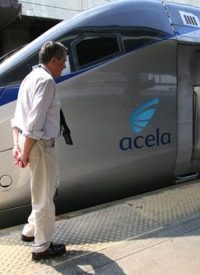
Central planning seldom makes economic sense. However good a scheme looks on paper in some politician’s office, planned on the taxpayer’s dime, it’s probably not worthwhile. If it really was a good scheme, then private enterprise would have already implemented the project.
What is true of economic sense is just as true of projects intended to achieve some other objective, like “saving the planet.” California, with $10.5 billion of federal help, wants to build an 800-mile high-speed rail system from Anaheim to San Francisco. The overall 13-corridor project could easily cost $200 billion.
Yet the number of Americans who actually use high-speed rails is remarkably small. In the Northeast Corridor, for example, where 45 million Americans live, the average daily number of riders on Amtrak is a paltry 28,500. Not only does Amtrak not make economic sense, but if the goal is to reduce pollution levels, a federal program that only affects about .5 percent of the regional population — in a densely populated area ideal for mass transmit — means that any goal achieved by these wasted federal dollars is the imaginary benefits of “doing good.”
This does not mean that rail traffic cannot be efficient, but if government were truly interested in improving the efficiency of passenger rail service, it would start by passing a national Right to Work law affecting all employees of rail services. The labor costs, which include, of course, a heavy marbling of union bosses’ salaries, add significantly to the cost of rail service. If rail service is considered good for the environment, then why not exempt these operations and associated support industries from all environmental laws and regulations? That would reduce the average cost per mile even more. Then offer for sale to private enterprise all the different rail lines that government wants in operation. Businessmen answerable to stockholders find efficiencies that bureaucrats answerable to unions, bureaucrats, and politicians never seem to see.
The reality, though, is that mass transit in and out of urban areas is increasingly irrelevant. Businesses have moved out of cities, driven by corrupt city governments, by urban crime, and by the perfectly logical decentralization of many businesses caused by the technological revolution in communications. There is nothing sinister about any of this. Mass urban transit systems that once were vital to our national economy today simply are not. If it made a great deal of sense to have high-speed mass-transit systems in and out of our largest cities, then private investors would be clamoring to build and operate these systems. No one not spending the taxpayers’ money looks at these rail systems and sees a good investment. Why can’t politicians take the hint?
Photo: AP Images



